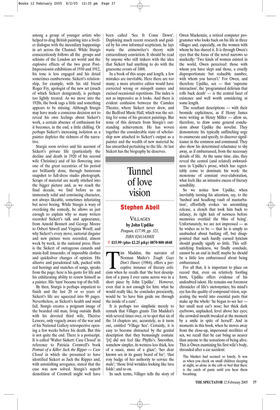Tunnel of love vision
Stephen Abell
VILLAGES by John Updike Penguin, £17.99, pp. 321, ISBN 024114308X ✆ £15.99 (plus £2.25 p&p) 0870 800 4848 Tim Madden, the narrator of Norman Mailer’s Tough Guys Don’t Dance (1984), offers a perceptive instance of literary criticism when he recalls that ‘the best description of a pussy I ever came across was in a short piece by John Updike’. However, even that is not enough for him: what he would really like, he concludes presciently, would be ‘to have him guide me through the inside of a cunt’.
It is perhaps too simplistic merely to remark that Villages grants Tim Madden’s wish several times over, or to spot that six of the 14 chapters are, accurately, as it turns out, entitled ‘Village Sex’. Certainly, it is easy to become distracted by the genital description that they bemusingly contain: ‘[it] did not feel like Phyllis’s. Smoother, somehow simpler, its wetness less thick, less of a sauce, more of a glaze’; ‘her dear known sex in its gauzy beard of fur’; ‘that rosy badge of her authority to service the male’; ‘those livid wrinkles looking like lava folds’; and so on.
In such terms, Villages tells the story of Owen Mackenzie, a retired computer programmer who looks back on his life in three villages and, especially, on the women with whom he has shared it. It is through Owen’s eyes that the focus of the novel narrows so markedly: ‘Two kinds of women existed in the world, Owen perceived: those with whom you have slept and those, a cruelly disproportionate but reducible number, with whom you haven’t.’ For Owen, and therefore Updike, sex — that ‘supreme interaction’, the ‘programmed delirium that rolls back death’ — is the central facet of existence and well worth considering at some length.
The resultant descriptions — with their bromide explicitness, as if Henry James were writing as Henry Miller — allow us, therefore, to draw some general conclusions about Updike the novelist. They demonstrate his typically unflinching urge to enumerate and specify, to discover significance in the common and communal. They also show his determined reluctance to shy away, as if embarrassed, from the necessary details of life. At the same time, alas, they reveal the central (and related) awkwardness in Updike’s prose, which has regrettably come to dominate his work: the monotone of constant over-elaboration, what feels like an intrusive excess of literary sensibility.
So we notice how Updike, when inevitably turning his attention, say, to the ‘hushed and headlong vault of masturbation’, effortfully evokes ‘an astonishing release, a clench that took him back to infancy, its tight knit of newness before memories overlaid the bliss of being’. Unfortunately, we are not impressed — as he wishes us to be — that he is simply so unabashed about bashing off, but disappointed that such hardly earned lyricism should grandly signify so little. This selfsatisfying frankness, we finally conclude, cannot be an end in itself; maybe he should be a little less embarrassed about being embarrassed.
For all that, it is important to place on record that, even on relatively footling form, Updike offers evidence of his undoubted talent. He remains our foremost chronicler of life’s metonymies; his mind’s eye has the quality of compound vision, separating the world into essential parts that make up the whole: ‘he began to see her her small neat cat’s nose; her thick dark eyebrows, unplucked, level above her eyes; the crowded mouth tweaked at the moment by a smile in spite of herself’. And in moments in this book, when he moves away from the close-up, impersonal sterilities of sex, we recall that he can bring us nearer than anyone to the sensations of being alive. This is Owen examining his first wife’s body, shrouded after a car accident:
The blanket had seemed so lonely. It was as when you check on small children sleeping at night, so alone in the crib or bed that there is the catch of panic until you hear them breathing.













































 Previous page
Previous page